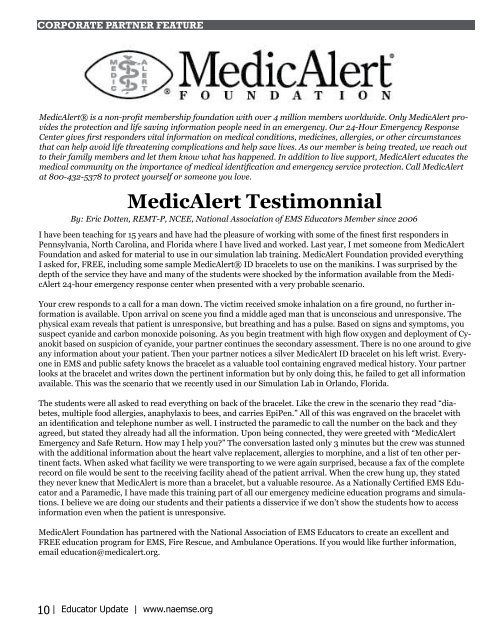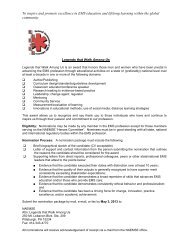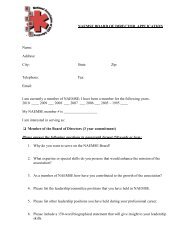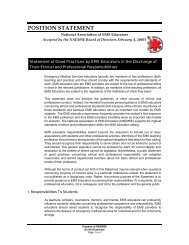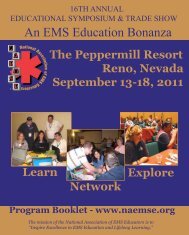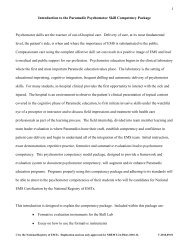What Every EMS Educator Should Know About
What Every EMS Educator Should Know About
What Every EMS Educator Should Know About
You also want an ePaper? Increase the reach of your titles
YUMPU automatically turns print PDFs into web optimized ePapers that Google loves.
CORPORATE PARTNER FEATURE<br />
MedicAlert® is a non-profit membership foundation with over 4 million members worldwide. Only MedicAlert provides<br />
the protection and life saving information people need in an emergency. Our 24-Hour Emergency Response<br />
Center gives first responders vital information on medical conditions, medicines, allergies, or other circumstances<br />
that can help avoid life threatening complications and help save lives. As our member is being treated, we reach out<br />
to their family members and let them know what has happened. In addition to live support, MedicAlert educates the<br />
medical community on the importance of medical identification and emergency service protection. Call MedicAlert<br />
at 800-432-5378 to protect yourself or someone you love.<br />
MedicAlert Testimonnial<br />
By: Eric Dotten, REMT-P, NCEE, National Association of <strong>EMS</strong> <strong>Educator</strong>s Member since 2006<br />
I have been teaching for 15 years and have had the pleasure of working with some of the finest first responders in<br />
Pennsylvania, North Carolina, and Florida where I have lived and worked. Last year, I met someone from MedicAlert<br />
Foundation and asked for material to use in our simulation lab training. MedicAlert Foundation provided everything<br />
I asked for, FREE, including some sample MedicAlert® ID bracelets to use on the manikins. I was surprised by the<br />
depth of the service they have and many of the students were shocked by the information available from the MedicAlert<br />
24-hour emergency response center when presented with a very probable scenario.<br />
Your crew responds to a call for a man down. The victim received smoke inhalation on a fire ground, no further information<br />
is available. Upon arrival on scene you find a middle aged man that is unconscious and unresponsive. The<br />
physical exam reveals that patient is unresponsive, but breathing and has a pulse. Based on signs and symptoms, you<br />
suspect cyanide and carbon monoxide poisoning. As you begin treatment with high flow oxygen and deployment of Cyanokit<br />
based on suspicion of cyanide, your partner continues the secondary assessment. There is no one around to give<br />
any information about your patient. Then your partner notices a silver MedicAlert ID bracelet on his left wrist. <strong>Every</strong>one<br />
in <strong>EMS</strong> and public safety knows the bracelet as a valuable tool containing engraved medical history. Your partner<br />
looks at the bracelet and writes down the pertinent information but by only doing this, he failed to get all information<br />
available. This was the scenario that we recently used in our Simulation Lab in Orlando, Florida.<br />
The students were all asked to read everything on back of the bracelet. Like the crew in the scenario they read “diabetes,<br />
multiple food allergies, anaphylaxis to bees, and carries EpiPen.” All of this was engraved on the bracelet with<br />
an identification and telephone number as well. I instructed the paramedic to call the number on the back and they<br />
agreed, but stated they already had all the information. Upon being connected, they were greeted with “MedicAlert<br />
Emergency and Safe Return. How may I help you?” The conversation lasted only 3 minutes but the crew was stunned<br />
with the additional information about the heart valve replacement, allergies to morphine, and a list of ten other pertinent<br />
facts. When asked what facility we were transporting to we were again surprised, because a fax of the complete<br />
record on file would be sent to the receiving facility ahead of the patient arrival. When the crew hung up, they stated<br />
they never knew that MedicAlert is more than a bracelet, but a valuable resource. As a Nationally Certified <strong>EMS</strong> <strong>Educator</strong><br />
and a Paramedic, I have made this training part of all our emergency medicine education programs and simulations.<br />
I believe we are doing our students and their patients a disservice if we don’t show the students how to access<br />
information even when the patient is unresponsive.<br />
MedicAlert Foundation has partnered with the National Association of <strong>EMS</strong> <strong>Educator</strong>s to create an excellent and<br />
FREE education program for <strong>EMS</strong>, Fire Rescue, and Ambulance Operations. If you would like further information,<br />
email education@medicalert.org.<br />
10 | <strong>Educator</strong> Update | www.naemse.org


